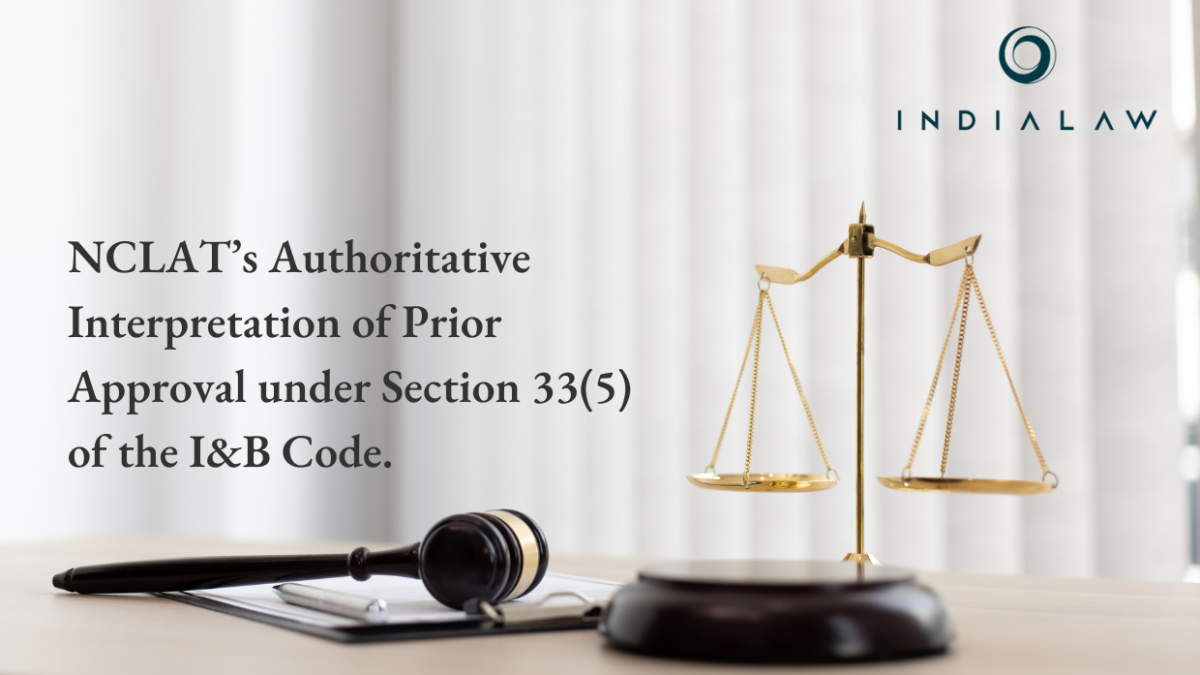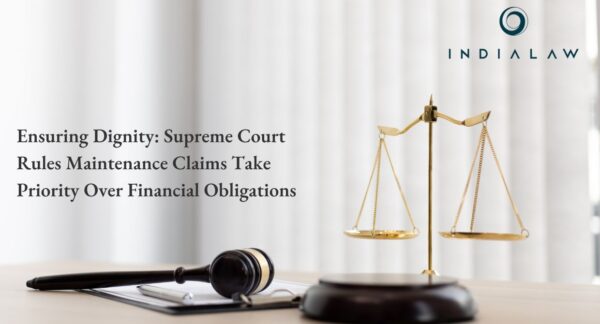NCLAT’s Authoritative Interpretation of Prior Approval under Section 33(5) of the I&B Code


Introduction
On May 31, 2024, the National Company Law Appellate Tribunal (NCLAT), Principal Bench, New Delhi, delivered a significant judgment in the matter of Slimline Realty Pvt. Ltd. v. Mr. Jigar Bhatt. The ruling, encapsulated in Company Appeal (AT) (Insolvency) Nos. 690, 693, 694, 695, and 714 of 2024, provides critical insights into the interpretation of Section 33(5) of the Insolvency and Bankruptcy Code, 2016 (‘I&B Code’).
Table of Contents
Facts of the Case
Reliance Marine & Offshore Ltd. (RMOL), hereinafter referred to as the Corporate Debtor, was admitted into the Corporate Insolvency Resolution Process (CIRP) on August 21, 2019. Subsequently, a liquidation order was passed on December 6, 2021. The Liquidator issued Demand Notice to the Appellants to make payment with respect to Non-Convertible Unsecured Bonds subscribed by the Corporate Debtor. The Liquidator filed various Section 7 Company Petitions against Slimline Realty Pvt. Ltd., Avocado Realty Pvt. Ltd., Budding Mercantile Company Pvt. Ltd., Replenish Realty Pvt. Ltd., and Winsome Realty Pvt. Ltd. (collectively referred to as the Appellants). The Corporate Debtor had no business operations, physical assets, or employees. Its sole asset was its subscription in Non-Convertible Unsecured Bonds (NCUBs) issued by the Appellants.
The bonds, subscribed in 2013, were due for redemption on July 25, 2019 and have a face value of Rs. 306.73 crore which has to be redeemed at 40% premium. Following the liquidation order, the Liquidator issued a demand notice to the Appellants to fulfill their payment obligations related to the bonds. The Liquidator also sought ex-post facto approval from the Adjudicating Authority (NCLT) to continue with these Section 7 applications. The said Application was allowed vide order dated 07th February, 2024. Aggrieved by the ex-post facto approval, the Appellants challenged the Order dated 07th February, 2024.
Contentions of the Appellants
The Appellants argued that the Liquidator failed to obtain prior approval from the Adjudicating Authority before initiating proceedings under Section 7 of the Insolvency and Bankruptcy Code (IBC), rendering the proceedings null and void from the outset. They contended that the requirement under Section 33(5) for obtaining prior approval is mandatory, emphasizing that the prohibitory language in the statute necessitates strict compliance and any deviation should invalidate the proceedings initiated by the Liquidator.
The Appellants relied on judgements such as Gurudevdatta Vksss Maryadit and Others vs. State of Maharashtra and Others, (2001) 4 SCC 534 which states “the words of a statute must be understood in their natural, ordinary or popular sense”,. Furthermore, they argued that post-facto approval could not retrospectively validate proceedings commenced without prior authorization, distinguishing ‘leave of the Court’ in previous Companies Acts from ‘prior approval’ under the IBC, which they asserted demands strict adherence and does not permit retrospective authorization. Additionally, the Appellants contended that they were not given an opportunity to be heard before the Adjudicating Authority granted ex-post facto approval to the Liquidator thus violating the principles of natural justice, arguing that this lack of procedural fairness further invalidated the proceedings.
Contentions of the Respondent
The Liquidator argued that the provision of Section 33(5) of the Code is only directory and not mandatory in nature. He contended that the post-facto approval granted by the Adjudicating Authority rectified any procedural lapse regarding prior approval, citing case law Bansidhar Shankarlal v. Mohd. Ibrahim & Anr. (1970) 3 SCC 900 and Erach Boman Khavar v. Tukaram Shridhar Bhat & Anr. (2013) 15 SCC 655, which support the view that proceedings initiated without prior approval are not void but become competent upon subsequent approval.
NCLAT’s Findings
1. Mandatory nature of prior approval under Section 33(5) of the I&B Code:
The Tribunal examined whether the requirement for the Liquidator to obtain prior approval from the Adjudicating Authority under the proviso to Section 33(5) of the IBC is mandatory or directory. Section 33(5) states that no suit or legal proceeding shall be initiated by or against the Corporate Debtor after a liquidation order has been passed, with an exception for proceedings initiated by the Liquidator with prior approval. The NCLAT held that the requirement for prior approval is mandatory. The legislative intent behind Section 33(5) is to protect the liquidation estate from unnecessary expenses and to maintain control over proceedings involving the Corporate Debtor. The use of prohibitory and negative language in the statute supports the conclusion that prior approval is essential, even though no specific consequences for non-compliance are outlined.
2. Validity of Post-Facto approval:
The NCLAT referred to the Supreme Court’s decision in Bansidhar Shankarlal v. Mohd. Ibrahim & Anr. (Civil Appeal No. 1927 of 1966) and Erach Boman Khavar v. Tukaram Shridhar Bhat & Anr. (Civil Appeal 11005 of 2013), which addressed similar provisions under previous Companies’ acts. The Tribunal held that the consequence of the proceedings instituted by the Liquidator on behalf of the Corporate Debtor without prior approval of the Adjudicating Authority under Section 33(5) is unauthorized and incompetent.
It was further found that the requirement of ‘leave of the Court’ in the earlier acts is analogous to ‘prior approval’ under Section 33(5) of the I&B Code. Therefore, the proceedings initiated without prior approval are not void but become competent from the date post-facto approval is granted. Consequently, the NCLAT upheld the Adjudicating Authority’s decision to grant post-facto approval, rendering the Liquidator’s proceedings valid from the date of such approval.
3. Opportunity for parties against whom proceedings are instituted:
The Tribunal considered whether the party against whom proceedings are to be initiated must be given an opportunity to be heard before the Adjudicating Authority grants approval under Section 33(5). The NCLAT concluded that the legislative scheme does not require giving notice or an opportunity to the party against whom proceedings are to be instituted.
Conclusion
The NCLAT’s decision in Slimline Realty Pvt. Ltd. v. Mr. Jigar Bhatt underscores the mandatory nature of obtaining prior approval under Section 33(5) of the IBC for initiating proceedings by the Liquidator on behalf of the Corporate Debtor. It also clarifies that post-facto approval can legitimize previously unauthorized proceedings and that no prior notice to the opposing party is required before granting such approval. This ruling provides crucial guidance on the procedural nuances of liquidation under the I&B Codes and reinforces the necessity of adhering to statutory requirements to protect the liquidation estate. The appeals by the Appellants were dismissed, affirming the Adjudicating Authority’s order. Accordingly, the present appeals were dismissed.




